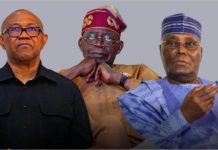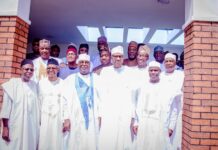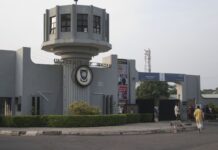Olusegun Adeniyi
Most of us have attended functions in our beloved country where, after a long wait (some lasting several hours), the guest of honour finally arrives with a retinue of security men and political hangers-on. The Master of Ceremony (MC) then takes over. “Distinguished ladies and gentlemen, please permit me to welcome His Excellency,” the MC begins before reeling out titles of the arriving guest. We are then told that ‘His Excellency’ is just a filler because the person we were expecting “is unavoidably absent due to urgent state matters”. No problem. The introduction continues with His Excellency “being ably represented by His Excellency (the MC again reels out titles for another stand-in) who is also unable to join us today because of the exigencies of state but is ably represented by His Excellency…”
This peculiar kind of protocol speaks to a lack of accountability that defines officialdom in our country. There is hardly any Nigerian who doesn’t feel devalued by the nauseating practice. With the exception perhaps of those at the receiving end of the buffoonery. The issue here is, if we cannot change such a simple but notorious image that requires just basic decency, how does anyone expect public officials to fix the more complex socio-economic problems? How can we accept that public functions are about wasting time and disrespecting people? Is it not obvious that those who hold the people they are supposed to serve in such contempt would feel entitled to abuse public resources?
A document by the United States-led Organization for Economic Co-operation and Development (OECD)—comprising 37 member countries which account for three-fifths of world GDP and three-quarters of world trade—on the required standard of ethics in government prescribes that public officials must serve “in a timely manner with care, respect and courtesy.” Those virtues are lost on most of those who hold the levers of power in Nigeria. Unfortunately, this is not restricted to the public sector, it is across the board. Today, the hallmark of being a ‘Big Man’ in Nigeria is to be able to live above the law, disrespect the people and be waited upon, including at public functions.
There is a short piece going round on WhatsApp that has no name of the author titled, ‘The things I missed at King Charles’ Coronation today’ which I find very instructive. It is about what transpired (or did not) last Saturday in London. It is a must read for authorities in Abuja and the 28 states as they plan their programmes for the 29 May inauguration. I hope they understand that what we showcase to the world at public ceremonies is sheer indiscipline and a lack of manners. And we cannot continue like this if we want to be considered as a civilized society. I have had opportunities to sit with diplomats and foreign dignitaries at events in our country and I see the way they laugh at us. But before I get ahead of myself, let me go back to the WhatsApp post. I will highlight each of the points made by the writer and put my own comments under it.
Nobody ‘stole’ my precious time, as everything went according to schedule; even the King and the Queen arrived the venue at the appropriate time. I never heard any announcement of “ladies and gentlemen, while we wait for the special guest of honour, may I beg your indulgence to…”
Public officials in Nigeria are notorious for coming late to events because ‘Bigmanism’ (and ‘Bigwomanism’) in our country is defined by how irresponsible someone in a position of authority can be. They will send their protocol people ahead to events to be alerted to ‘start coming’ once everybody is seated. Leading by example does not apply to them. From politicians to businessmen and traditional rulers, especially the new ones being installed these days, what they exhibit is utter contempt for the people. Midway to an event, they will arrive with their unruly mob ostensibly to ‘steal the show’ and in the process disrupt proceedings. They do it at both official and non-official ceremonies, including weddings and burials and we even applaud them.
There was no siren and escorts of dignitaries driving recklessly into the venue and trying to outdo one another.
The competition among aides of these officials is a security risk on their own. There have been scuffles and fights over turf by these aides and security details in their attempt to boost the bloated egos of their principals. I have witnessed a few that portray us as no better than barbarians. Meanwhile, official convoys in Nigeria are needlessly long and wasteful because it is seen as a projection of power. Yet what is being advertised is that the entire essence of seeking public office in Nigeria is to be able to live large at the expense of the people. Not to serve the public good.
There were no area boys or praise singers ushering people into the venue; and no intimidating ‘bouncers’ at the entrance of the hall requesting to check one’s Invite.
I understand that many uninvited guests like to turn up at events in Nigeria so having bouncers around can help with crowd control so long as they are polite. There are also cultural aspects to the issue of praise singers. I will not advocate a ban. A confession here: Like most people, I enjoy the beats that come from some of these local drummers and whether some people believe it or not, I can throw a few dance steps. But a safe distance can be created for them so that they do not become a nuisance.
I didn’t see police escorts wielding AK-47 and asking people to give way. No chief of protocol or ADC leading the PM and showing the way as if the man was a toddler. There was no need to read out the names and appointments of all the ‘big men and women’ present as part of Protocol before making any speech. In fact, there was no ‘existing protocol’ for anybody to stand on today.
This was the response from a senior official at the Villa to which I forwarded the message: ‘We are truly a special breed. That’s why security people outnumber guests and aides take up valuable seats and space at events. Our president entered Westminster Abbey alone and heavens did not fall’. The message here is that the gra-gra is not necessary. But this will be addressed another day when I share experiences from another life. Meanwhile, the idea that every speaker must begin with ‘His Excellency…’ and then going on to recognize (with bogus titles) all those who had already been recognized is crazy. Interestingly, in Nigeria, the MC does not work alone. They also have ‘aides’, mostly from the organisers or simply those who want to be noticed. Or even aides of our big men and women. Intermittently, they will walk to the podium to whisper to the MC, sometimes with a note. The important information being passed is the name or perhaps title of an important dignitary or their spouse who has been omitted or not correctly pronounced. The ‘apologies’ to His or Her Excellency can take another three minutes. Meanwhile, after every speech, the MC must rehash for the audience what ‘His Excellency’ had just said. In the process, they inject their own view, almost in the manner of ‘Icheokwu’ (that inimitable television drama for Nigerians of a certain generation) even when the speech was rendered in English! And talking about speech, elected public officials in Nigeria are too important to carry their own speech. Somebody must carry it for them to place the file on the podium!
I never saw members of the media running around with their cameras, blocking the views of invited guests, and almost pushing their microphones or handsets into the mouths of the officiating ministers.
Okay, this one is too close to home. I agree as a reporter that my colleagues can do better. But I am also aware that many of the ‘journalists’ we see at public events are touts. In any case, with social media, everybody is a journalist these days. Even this can be controlled by whoever manages the media for an event if they work with security.
I looked round to catch a glimpse of those hawking ‘pure water’, colanut, chewing gum, white handkerchiefs, and new currency notes inside the hall, but there was none.
The less said about this indiscipline the better. The people here are at the margins of society trying to eke out a living and probably hoping for any crumbs that would fall from these ceremonies. There is also an economic dimension to this that we should not ignore. Knowing the way officialdom works in Nigeria, it is easy to enforce suggestions that these people be done away with, and the directive will be enforced with brutality. I have also witnessed a couple of such unpleasant situations.
The prophets in the UK probably didn’t hear nothing from God; So, there was no single prophecy of ‘what will happen if Charles was crowned as king’.
The commercialization of prophecy is another Nigerian invention by which merchandise is made of the name of God. We see them every election season. They will make rational (sometimes irrational) deductions of who they think would win an election, and then proclaim that God told them. Mostly based on their personal bias, their god will tell them who would die before or after election or those who would win and not be sworn in. I guess that is another lucrative ‘industry’ we can leave for today since it also provides its own entertainment.
Overall, the issue here, as my late principal, President Umaru Musa Yar’Adua reminded us in his inaugural speech on 29 May 2007, is that we will not develop as a nation until we “stop justifying every shortcoming with that unacceptable phrase, ‘the Nigerian factor’ as if to be a Nigerian is to settle for less.” We as a people must begin to demand more accountability from our leaders: They are there to serve, and not the other way round. And you cannot serve people without respecting them.
Coming late to events and disrupting proceedings is an irresponsible behaviour that we must curb. Dr. Muiz Banire, SAN, a former Lagos State Commissioner, and erstwhile National Legal Adviser of the ruling All Progressives Congress (APC), last December wrote about this vexatious issue of lack of appreciation of time and timeliness in Nigeria. “A time waster is a destroyer of nature and human values. While this unfortunate attitude reflects in the personal lives of many, it has become a permanent feature of our public or political life”, Banire wrote, citing several examples to buttress his point, including during the last conferment of national honours when President Muhammadu Buhari arrived two hours late for the ceremony without any apology to the audience by the organisers.
Now to the future. On 29th May in Abuja, Asiwaju Bola Ahmed Tinubu will be inaugurated to succeed President Buhari at a ceremony for which there will be many local and foreign dignitaries. Hundreds of millions of Naira will be expended on the event. The same thing will happen in the capital cities of 28 states. If the past were any guide, the ceremonies will be chaotic. But as I stated earlier, Nigeria will not develop until we begin to change some of these seemingly little things that present us to the world as unserious people.




























































